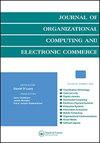有效使用分析DSS和工作绩效:超越技术接受
IF 1.9
4区 管理学
Q3 COMPUTER SCIENCE, INFORMATION SYSTEMS
Journal of Organizational Computing and Electronic Commerce
Pub Date : 2019-04-03
DOI:10.1080/10919392.2019.1571756
引用次数: 3
摘要
本研究扩展和测试了有效使用信息系统(IS)所做的工作,通过开发这一结构的措施,将使用的概念化扩展到流行的技术接受模型(TAM)之外。有效使用设定了使用的维度(知情行动、再现保真度和透明交互),旨在衡量用户在给定环境中有效使用信息系统的能力。超越简单的采用和使用上下文是一个重要的区别,它扩展了研究人员和实践者评估使用有效性的能力。在工作环境中,与仅仅拥有高使用率相比,拥有高性能和有效的系统使用更为重要。因此,本研究使用分析决策支持系统(DSS)的背景下,并测试了有效使用的维度和工作绩效之间的关系。一项调查(N = 265)高管的工作经验使用分析决策支持系统进行了最大限度的现实性和概括性。本研究首次对有效使用与绩效之间的关系进行了实证检验。结果表明,知情行为是个人工作绩效的重要预测因子。然而,表征保真度和透明互动并不是工作绩效的显著预测因子。本文章由计算机程序翻译,如有差异,请以英文原文为准。
Effective use of analytic DSS and job performance: Looking beyond technology acceptance
ABSTRACT This study extends and test the work done on effective use of information systems (IS) by developing measures for this construct which expands the conceptualization of use beyond the popular technology acceptance model (TAM). Effective use posits dimensions of use (informed action, representational fidelity, and transparent interaction) which are intended to measure a user’s ability to effectively use an IS in a given context. Moving beyond simple adoption and use contexts is an important distinction that expands researcher’s and practitioner’s ability to assess usage effectiveness. In a work context, it is more important to have high performance and effective usage of systems in comparison to just having high usage rates. Therefore this study uses the context of analytic decision support systems (DSS) and tests the relationship between the proposed dimensions of effective use and job performance. A survey (N = 265) of executives with work experience using analytic DSS was conducted to maximize realism and generalizability. This study is the first to empirically test the proposed relationships of effective use to performance. Results indicate that informed action is a significant predictor of individual job performance. However, representational fidelity and transparent interaction are not significant predictors of job performance.
求助全文
通过发布文献求助,成功后即可免费获取论文全文。
去求助
来源期刊

Journal of Organizational Computing and Electronic Commerce
工程技术-计算机:跨学科应用
CiteScore
5.80
自引率
17.20%
发文量
7
审稿时长
>12 weeks
期刊介绍:
The aim of the Journal of Organizational Computing and Electronic Commerce (JOCEC) is to publish quality, fresh, and innovative work that will make a difference for future research and practice rather than focusing on well-established research areas.
JOCEC publishes original research that explores the relationships between computer/communication technology and the design, operations, and performance of organizations. This includes implications of the technologies for organizational structure and dynamics, technological advances to keep pace with changes of organizations and their environments, emerging technological possibilities for improving organizational performance, and the many facets of electronic business.
Theoretical, experimental, survey, and design science research are all welcome and might look at:
• E-commerce
• Collaborative commerce
• Interorganizational systems
• Enterprise systems
• Supply chain technologies
• Computer-supported cooperative work
• Computer-aided coordination
• Economics of organizational computing
• Technologies for organizational learning
• Behavioral aspects of organizational computing.
 求助内容:
求助内容: 应助结果提醒方式:
应助结果提醒方式:


